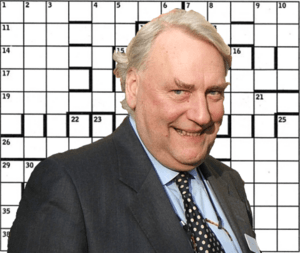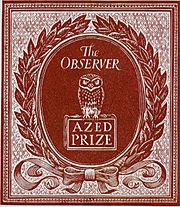Azed facts for kids
The Azed crossword is a famous puzzle found every Sunday in The Observer newspaper. It's special because one person, Jonathan Crowther, has created every single puzzle since it started in March 1972! He also judges a monthly competition where people write their own crossword clues.
Jonathan Crowther uses the pen name "Azed." This name comes from "Deza," a Spanish historical figure, spelled backward. It connects to the history of challenging crosswords, like those made by "Torquemada" and "Ximenes," who created similar puzzles before Azed. The Azed crossword is known for its clever wordplay, which is a key part of British cryptic crosswords.
This puzzle is quite challenging! It often uses words that are not common, or old-fashioned words, and sometimes refers to classic stories or history. This makes it a bit harder than regular crosswords, even for people who are very good at solving them. The 2000th Azed puzzle came out on September 26, 2010. The 500th competition puzzle was published on August 1, 2010.
Contents
The Puzzle's Secrets
The Azed crossword uses a special grid with bars instead of blocks. This means it can use a wider range of words. About half of the answers might be "dictionary words" that you don't hear every day. Because of this, The Chambers Dictionary is a must-have tool for most people who try to solve it.
Even though the words can be tricky, the puzzle is fair. Azed is very strict about how clues are written. He makes sure they are grammatically correct and make perfect sense. This careful clue writing helps you figure out the right answer and feel sure that you've got it! If a word is from a specific dialect or is very old, the clue will usually tell you. If a super rare answer isn't even in Chambers Dictionary, Azed will let you know below the clues. When the answers are published, they often come with short notes explaining how the harder clues lead to their solutions.
Every six weeks or so, there's a "special" Azed crossword. These puzzles have unique rules for solving the clues or putting the answers into the grid. Some popular special types include "Spoonerisms" (where words are swapped, like "bunny phone" for "funny bone") and "Misprints" (where clues have intentional errors). Azed invented many of these special puzzles himself. Others, like "Playfair" and "Printer's Devilry," were created by other famous crossword setters. These special puzzles often celebrate events or use elements from other types, like "Letters Latent."
The Clue-Writing Competition
Azed also hosts clue-writing competitions, which happen on the first Sunday of each month and at Christmas. To enter, you must correctly solve the crossword grid. Then, you have to create your own cryptic clue for a specific word from the puzzle. For a regular puzzle, the word you need to clue is simply defined. If it's a "special" competition puzzle, finding the clue-word might be part of the challenge itself. Also, your clue might need to follow the special rules of that month's puzzle.
The results of the competition are announced three weeks later. There are three main prizes, which include a book token and a special Azed bookplate. The names of the winners and their winning clues are published. About twenty other people also get their names published because their clues were "Very Highly Commended" (VHC). The first-prize winner also gets to hold the "Azed Instant Victor Verborum Cup" for a month before passing it to the next winner. ("Instant" here means "of this month.") For the Christmas competition, even the VHC winners receive prizes!
On weeks when there isn't a competition, three solvers are chosen randomly from all the correct entries. They also receive book tokens as prizes.
Every year, an "Honours List" is published. This list shows the people who have been the best at writing clues throughout the year. If your clue wins a prize, you get two points. If it's "Very Highly Commended," you get one point. The overall annual champions get to keep a silver trophy for a year before it's passed on. If someone scores four points or more but hasn't won a prize, they get a special consolation prize. The Azed year usually runs from September to August.
The Azed Slip: A Learning Tool
The Azed Slip is a special publication that lists all the "Very Highly Commended" (VHC) clues in full. It also names about fifty "Highly Commended" (HC) solvers whose clues were good but didn't quite make the VHC list. The VHC clues are fun to read and are a great way for people who want to get better at writing clues to learn. The HC list offers encouragement to new clue-writers.
After the lists, Azed shares his own comments. People who solve Azed puzzles often send him letters, not just their completed grids and clues. They might praise a clever clue, ask for an explanation of another, or share something interesting about the competition's clue-word. In his comments, Azed might reply to these letters or explain common problems that month's competitors faced. He often uses anonymous examples of clues that didn't quite work to teach a lesson. He also shares news about upcoming crossword events or books, and remembers long-time competitors who have passed away. You can get the Azed Slip by subscribing to a printed version, or you can read it for free on The Guardian website's crossword page or the & lit. website, which has every Azed slip ever published.
The Chambers Crossword Manual calls the Azed Slip "Azed's Clue-writing School" because it has helped so many people improve their clue-writing skills. It also helps create a strong community among Azed solvers. Every 250 puzzles, a special lunch or dinner is held in Oxford, where Azed lives. Many solvers travel long distances to attend, even flying in from other countries like Scotland and Ireland. The most recent one, in July 2015, celebrated Azed Puzzle No. 2250.
Well-Known Azed Fans
Many famous people enjoy solving the Azed crossword or have been part of its community. Here are a few:
- Joyce Cansfield - She was the first winner of the TV quiz show Countdown and helped create crosswords for The Times newspaper.
- Colin Dexter - He wrote the popular Inspector Morse detective novels and also set crosswords for The Times.
- Michael Frayn - A well-known English playwright and novelist.
- Harvey Freeman - He was the "Supreme Champion" of the Countdown TV show.
- Don Manley - He wrote the Chambers Crossword Manual and regularly creates crosswords for many British newspapers, including The Times.
- Tim Moorey - He regularly sets crosswords for publications like The Week and The Times, and wrote the book How to Crack Cryptic Crosswords.
- Sir Jeremy Morse - He was a former leader of the University of Bristol and chairman of Lloyds Bank.
- Vikram Seth - A famous writer and poet.
- Francis Wheen - A journalist, broadcaster, and writer.
- Sir David Willcocks - A famous conductor and composer, and former director of the Royal College of Music.



